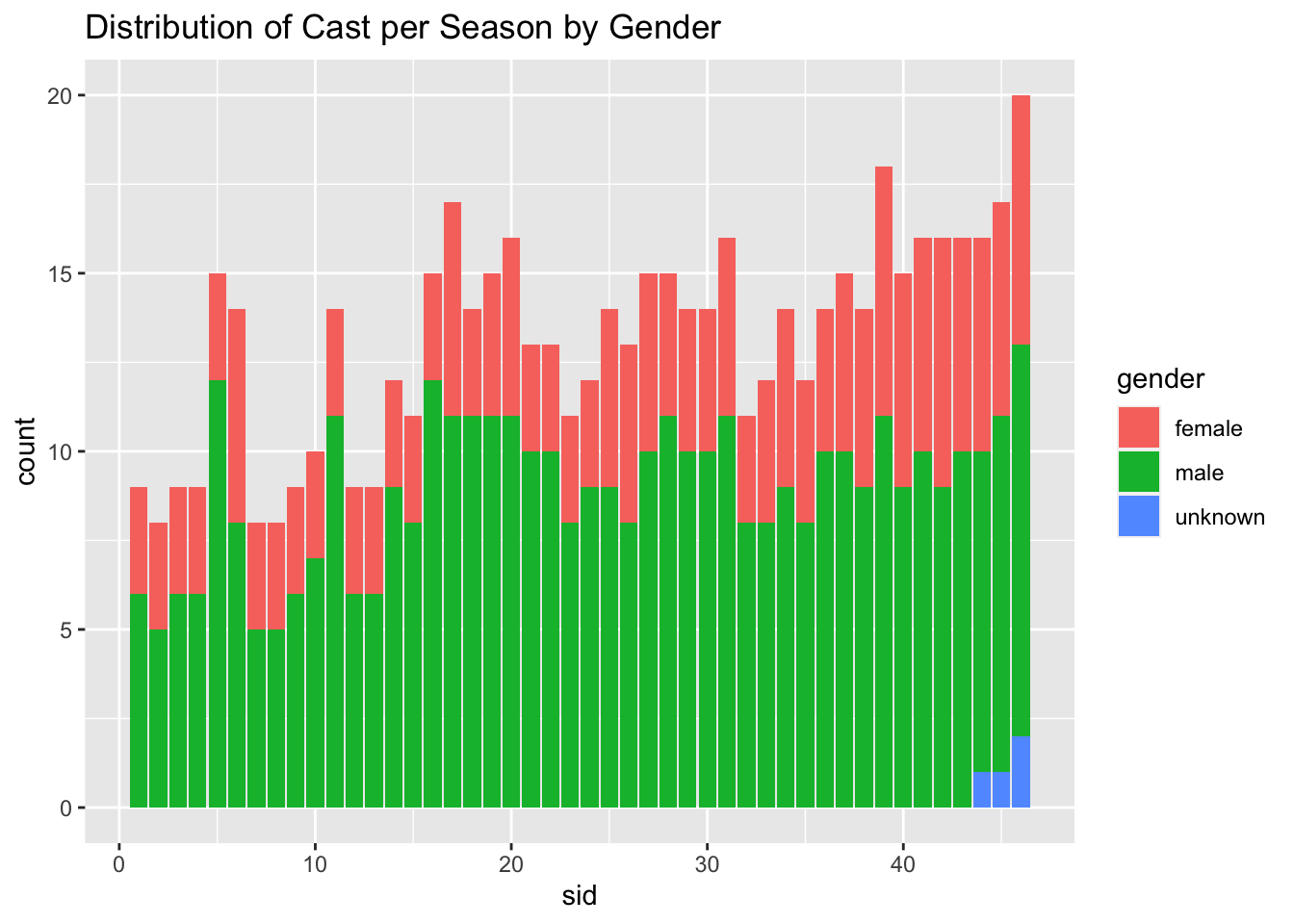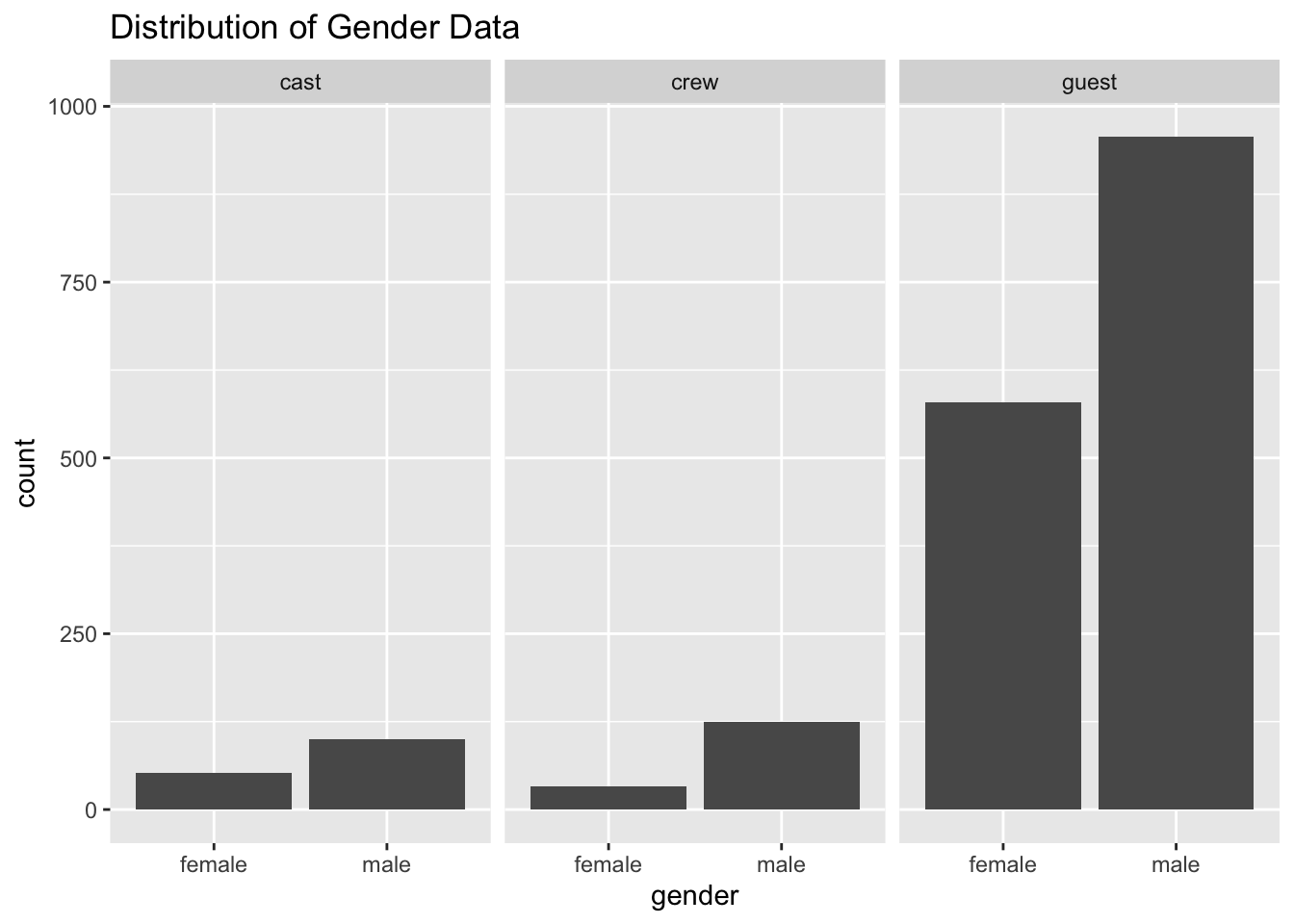library(tidyverse)
library(ggplot2)
library(dplyr)
knitr::opts_chunk$set(echo = TRUE, warning=FALSE, message=FALSE)Challenge 8
challenge_8
snl
Joining Data
Challenge Overview
Today’s challenge is to:
- read in multiple data sets, and describe the data set using both words and any supporting information (e.g., tables, etc)
- tidy data (as needed, including sanity checks)
- mutate variables as needed (including sanity checks)
- join two or more data sets and analyze some aspect of the joined data
(be sure to only include the category tags for the data you use!)
Read in data
Read in one (or more) of the following datasets, using the correct R package and command.
- military marriages ⭐⭐
- faostat ⭐⭐
- railroads ⭐⭐⭐
- fed_rate ⭐⭐⭐
- debt ⭐⭐⭐
- us_hh ⭐⭐⭐⭐
- snl ⭐⭐⭐⭐⭐
snl_actors <- read_csv("_data/snl_actors.csv")
head(snl_actors)# A tibble: 6 × 4
aid url type gender
<chr> <chr> <chr> <chr>
1 Kate McKinnon /Cast/?KaMc cast female
2 Alex Moffat /Cast/?AlMo cast male
3 Ego Nwodim /Cast/?EgNw cast unknown
4 Chris Redd /Cast/?ChRe cast male
5 Kenan Thompson /Cast/?KeTh cast male
6 Carey Mulligan /Guests/?3677 guest andy snl_casts <- read_csv("_data/snl_casts.csv")
head(snl_casts)# A tibble: 6 × 8
aid sid featured first_epid last_epid update_anchor n_episodes
<chr> <dbl> <lgl> <dbl> <dbl> <lgl> <dbl>
1 A. Whitney Brown 11 TRUE 19860222 NA FALSE 8
2 A. Whitney Brown 12 TRUE NA NA FALSE 20
3 A. Whitney Brown 13 TRUE NA NA FALSE 13
4 A. Whitney Brown 14 TRUE NA NA FALSE 20
5 A. Whitney Brown 15 TRUE NA NA FALSE 20
6 A. Whitney Brown 16 TRUE NA NA FALSE 20
# ℹ 1 more variable: season_fraction <dbl>snl_seasons <- read_csv("_data/snl_seasons.csv")
head(snl_seasons)# A tibble: 6 × 5
sid year first_epid last_epid n_episodes
<dbl> <dbl> <dbl> <dbl> <dbl>
1 1 1975 19751011 19760731 24
2 2 1976 19760918 19770521 22
3 3 1977 19770924 19780520 20
4 4 1978 19781007 19790526 20
5 5 1979 19791013 19800524 20
6 6 1980 19801115 19810411 13Briefly describe the data
Tidy Data (as needed)
Is your data already tidy, or is there work to be done? Be sure to anticipate your end result to provide a sanity check, and document your work here.
snl_actors <- snl_actors %>%
drop_na()
snl_actors# A tibble: 2,249 × 4
aid url type gender
<chr> <chr> <chr> <chr>
1 Kate McKinnon /Cast/?KaMc cast female
2 Alex Moffat /Cast/?AlMo cast male
3 Ego Nwodim /Cast/?EgNw cast unknown
4 Chris Redd /Cast/?ChRe cast male
5 Kenan Thompson /Cast/?KeTh cast male
6 Carey Mulligan /Guests/?3677 guest andy
7 Marcus Mumford /Guests/?3679 guest male
8 Aidy Bryant /Cast/?AiBr cast female
9 Steve Higgins /Crew/?StHi crew male
10 Mikey Day /Cast/?MiDa cast male
# ℹ 2,239 more rowssnl_casts <- snl_casts %>%
select(aid, sid, featured, update_anchor, n_episodes, season_fraction)
snl_casts <- snl_casts %>%
drop_na()
snl_casts# A tibble: 614 × 6
aid sid featured update_anchor n_episodes season_fraction
<chr> <dbl> <lgl> <lgl> <dbl> <dbl>
1 A. Whitney Brown 11 TRUE FALSE 8 0.444
2 A. Whitney Brown 12 TRUE FALSE 20 1
3 A. Whitney Brown 13 TRUE FALSE 13 1
4 A. Whitney Brown 14 TRUE FALSE 20 1
5 A. Whitney Brown 15 TRUE FALSE 20 1
6 A. Whitney Brown 16 TRUE FALSE 20 1
7 Alan Zweibel 5 TRUE FALSE 5 0.25
8 Sasheer Zamata 39 TRUE FALSE 11 0.524
9 Sasheer Zamata 40 TRUE FALSE 21 1
10 Sasheer Zamata 41 FALSE FALSE 21 1
# ℹ 604 more rowssnl_seasons <- snl_seasons %>%
drop_na()
snl_seasons# A tibble: 46 × 5
sid year first_epid last_epid n_episodes
<dbl> <dbl> <dbl> <dbl> <dbl>
1 1 1975 19751011 19760731 24
2 2 1976 19760918 19770521 22
3 3 1977 19770924 19780520 20
4 4 1978 19781007 19790526 20
5 5 1979 19791013 19800524 20
6 6 1980 19801115 19810411 13
7 7 1981 19811003 19820522 20
8 8 1982 19820925 19830514 20
9 9 1983 19831008 19840512 19
10 10 1984 19841006 19850413 17
# ℹ 36 more rowsAre there any variables that require mutation to be usable in your analysis stream? For example, do you need to calculate new values in order to graph them? Can string values be represented numerically? Do you need to turn any variables into factors and reorder for ease of graphics and visualization?
Document your work here.
colnames(snl_actors)[1] "aid" "url" "type" "gender"colnames(snl_casts)[1] "aid" "sid" "featured" "update_anchor"
[5] "n_episodes" "season_fraction"colnames(snl_seasons)[1] "sid" "year" "first_epid" "last_epid" "n_episodes"snl_season <- snl_seasons %>%
select(sid, year)
snl_cast <- snl_casts %>%
select(aid, sid, n_episodes)Join Data
Be sure to include a sanity check, and double-check that case count is correct!
snl_data <- snl_casts %>%
select(-update_anchor, -season_fraction, -n_episodes) %>%
left_join(snl_season, by="sid")
snl_data# A tibble: 614 × 4
aid sid featured year
<chr> <dbl> <lgl> <dbl>
1 A. Whitney Brown 11 TRUE 1985
2 A. Whitney Brown 12 TRUE 1986
3 A. Whitney Brown 13 TRUE 1987
4 A. Whitney Brown 14 TRUE 1988
5 A. Whitney Brown 15 TRUE 1989
6 A. Whitney Brown 16 TRUE 1990
7 Alan Zweibel 5 TRUE 1979
8 Sasheer Zamata 39 TRUE 2013
9 Sasheer Zamata 40 TRUE 2014
10 Sasheer Zamata 41 FALSE 2015
# ℹ 604 more rows#Graph representing aid and which years they worked in
ggplot(snl_data, aes(aid)) +
geom_bar() +
labs(title = "Graph showing how many season each aid worked for")
snl_data1 <- snl_actors %>%
select(-url) %>%
inner_join(snl_cast, by="aid")
snl_data1# A tibble: 607 × 5
aid type gender sid n_episodes
<chr> <chr> <chr> <dbl> <dbl>
1 Kate McKinnon cast female 37 5
2 Kate McKinnon cast female 38 21
3 Kate McKinnon cast female 39 21
4 Kate McKinnon cast female 40 21
5 Kate McKinnon cast female 41 21
6 Kate McKinnon cast female 42 21
7 Kate McKinnon cast female 43 21
8 Kate McKinnon cast female 44 21
9 Kate McKinnon cast female 45 18
10 Kate McKinnon cast female 46 17
# ℹ 597 more rowsgender_data <- snl_actors %>%
filter(gender == "male" | gender == "female")
snl_data1 %>%
filter(type == "cast") %>%
ggplot(aes(sid, fill=gender)) +
geom_bar() +
labs(title = "Distribution of Cast per Season by Gender")
ggplot(gender_data, aes(gender)) +
geom_bar() +
facet_wrap(vars(type)) +
labs(title = "Distribution of Gender Data")